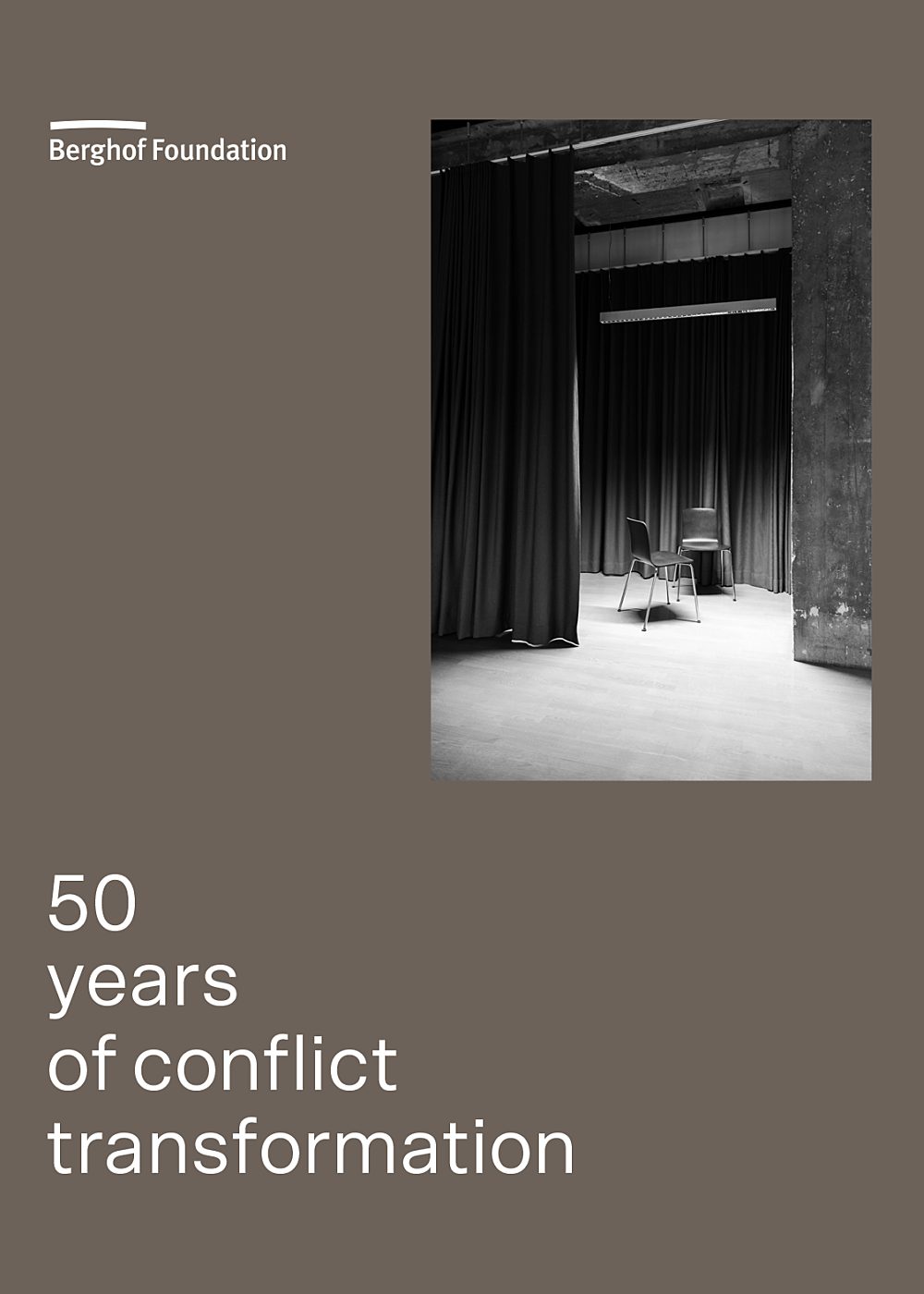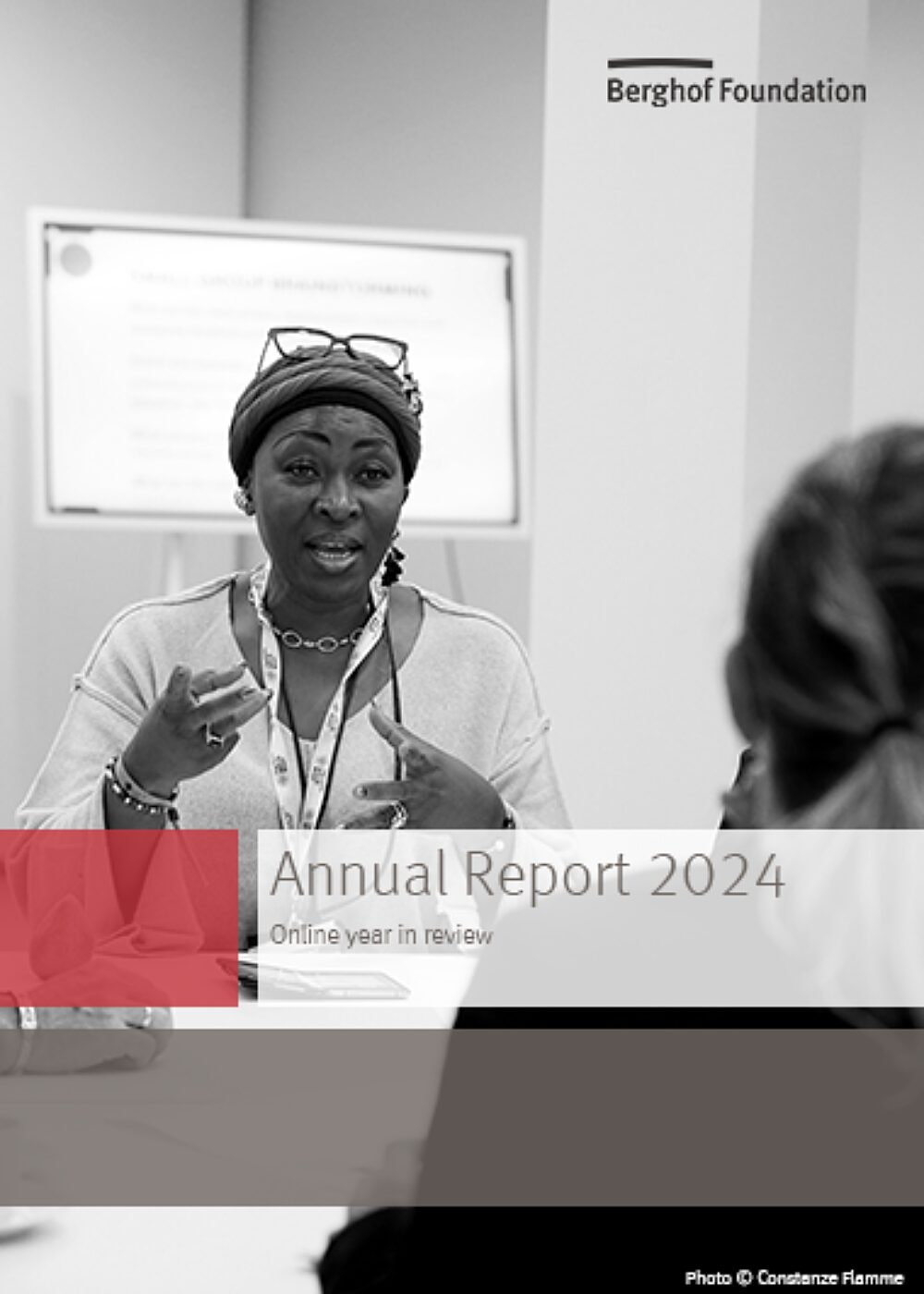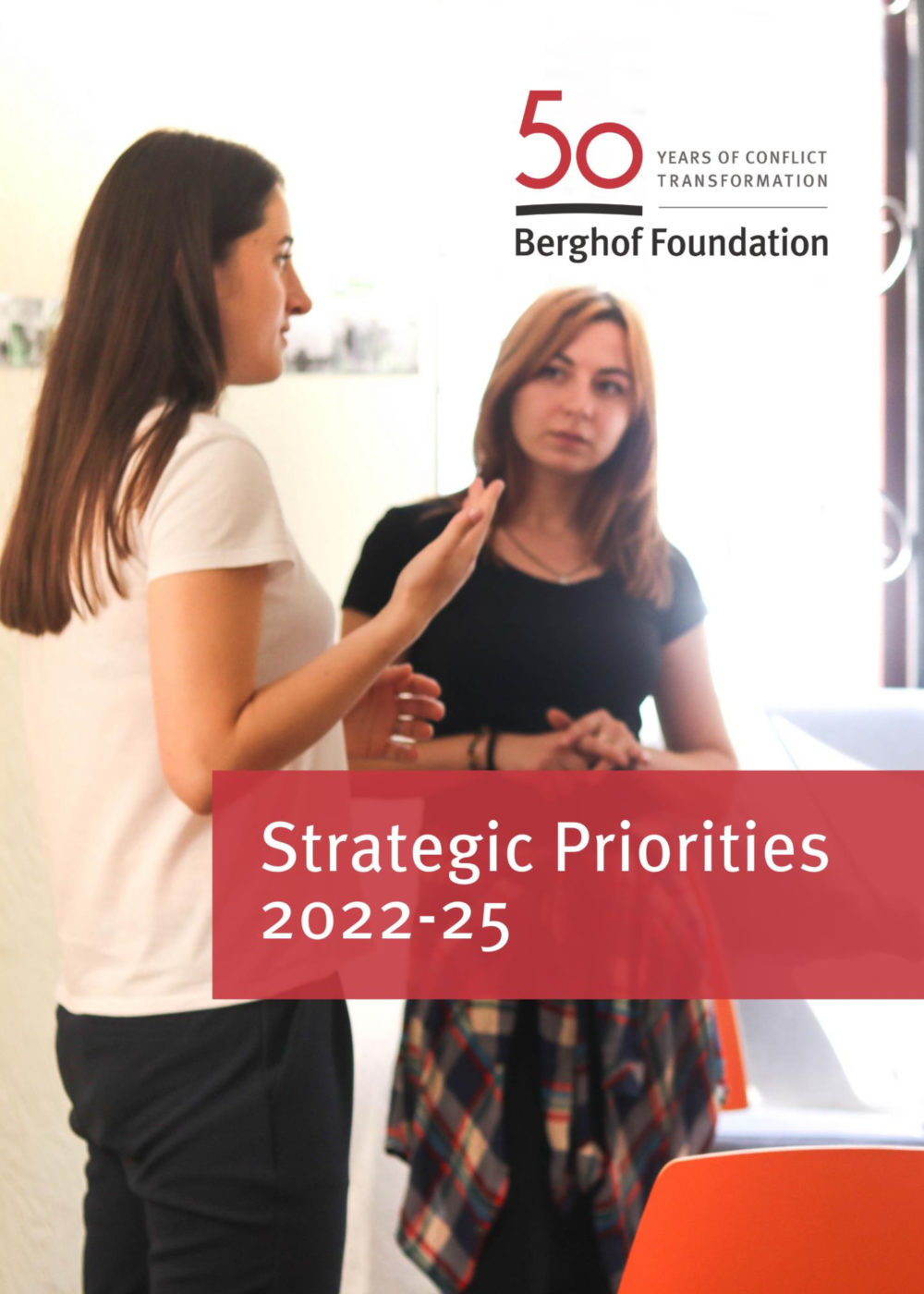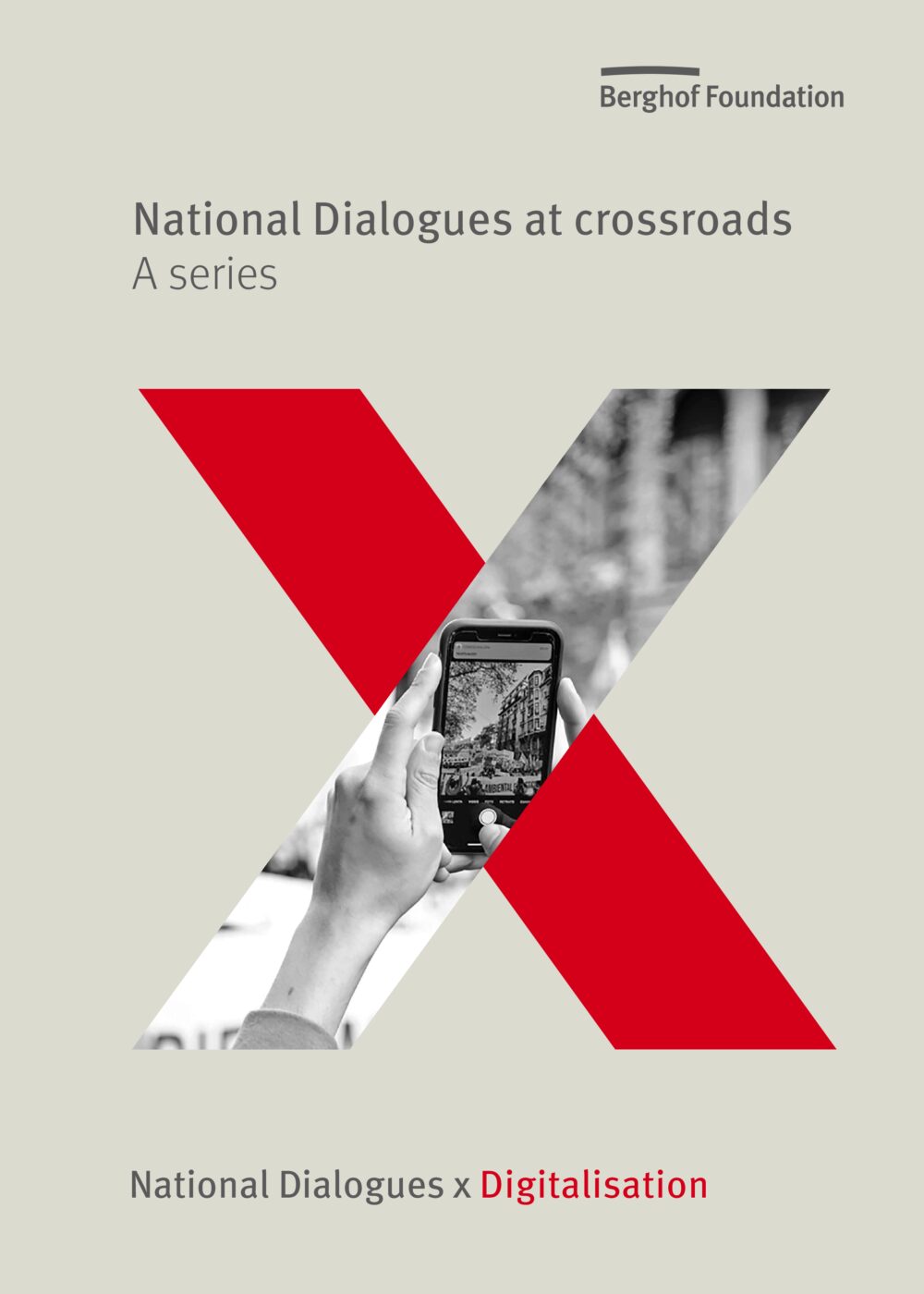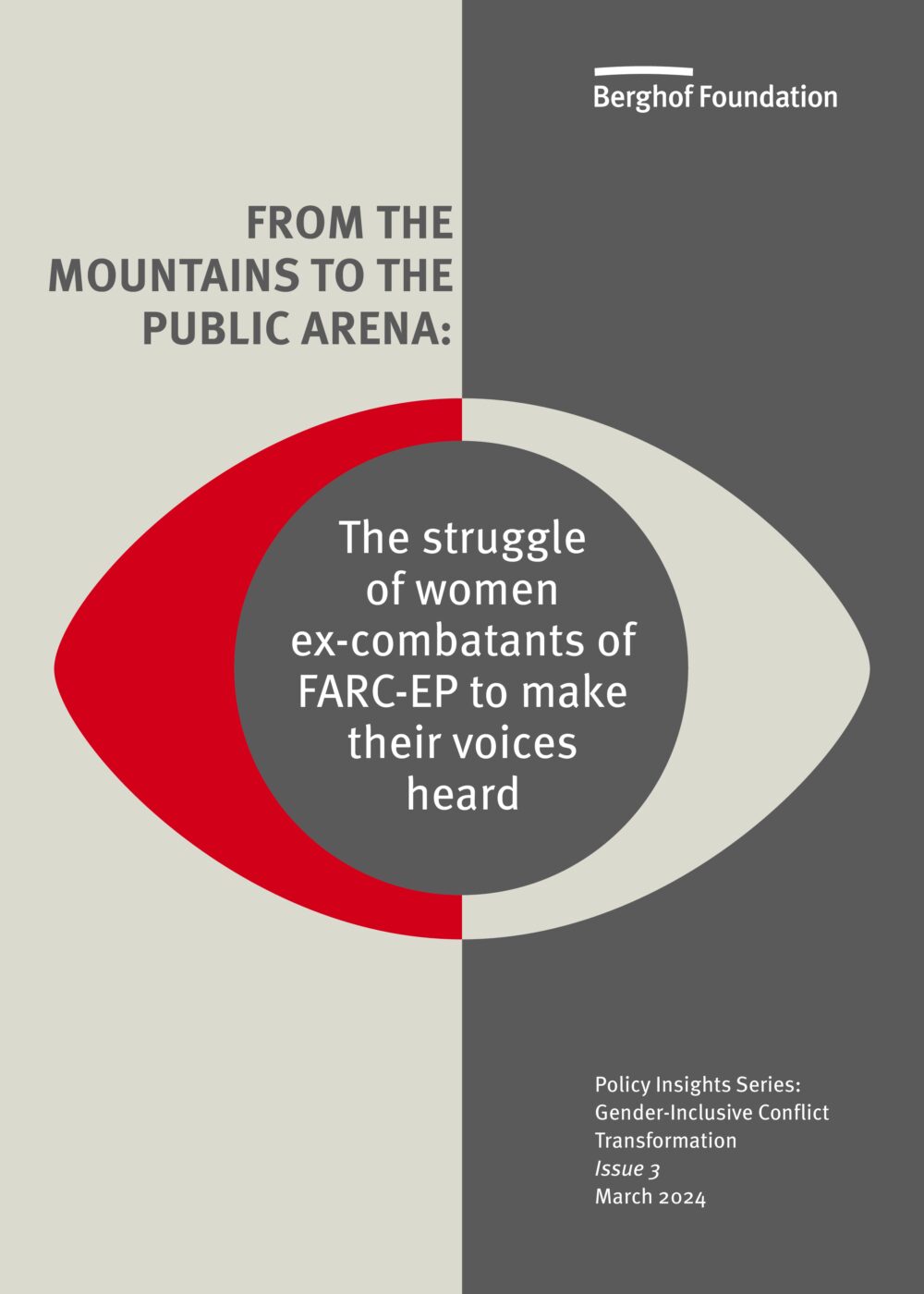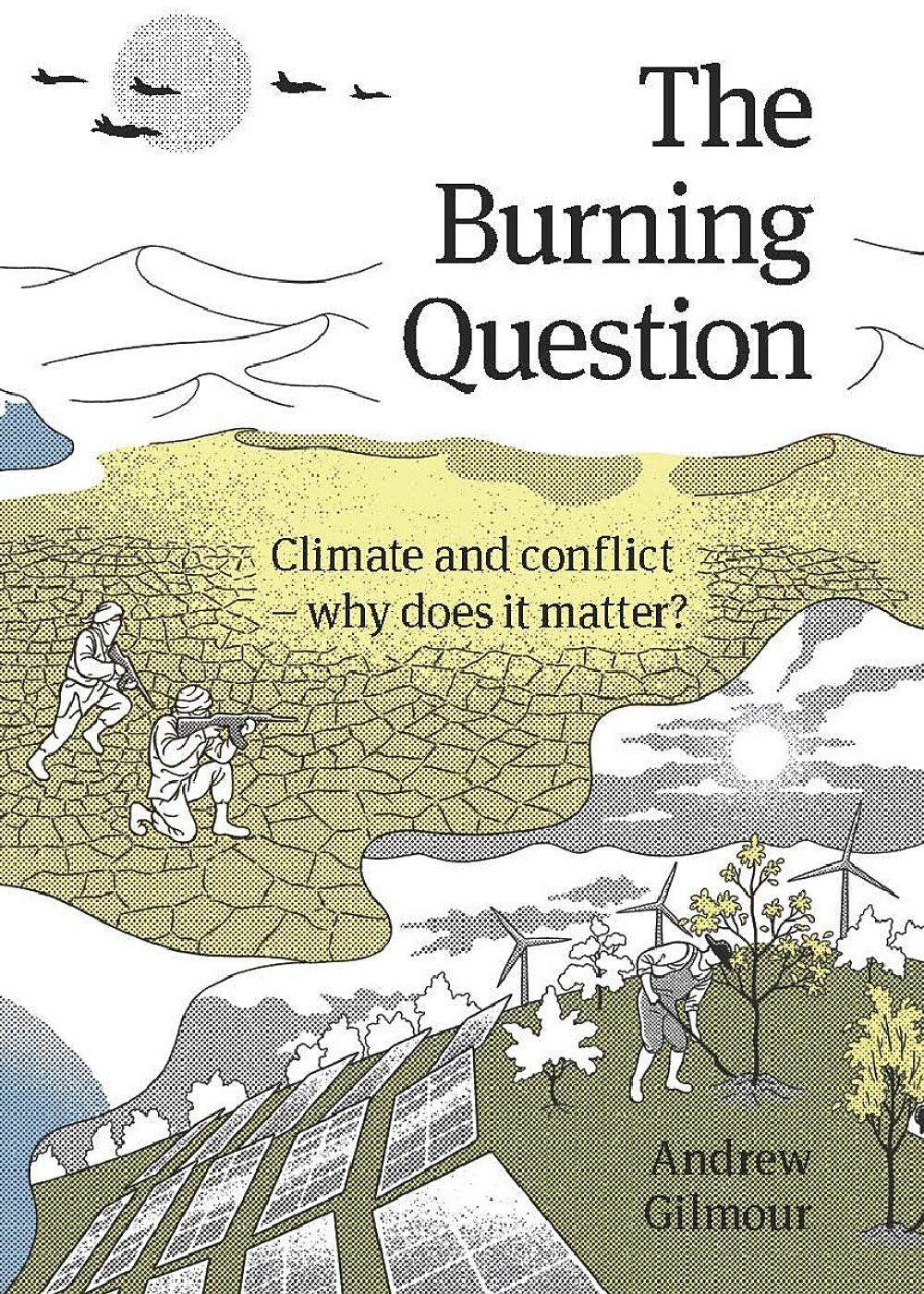Our Library
Explore our publications, from research papers and series to educational materials, covering all aspects of conflict transformation and peace promotion.
Highlights
Collections
-
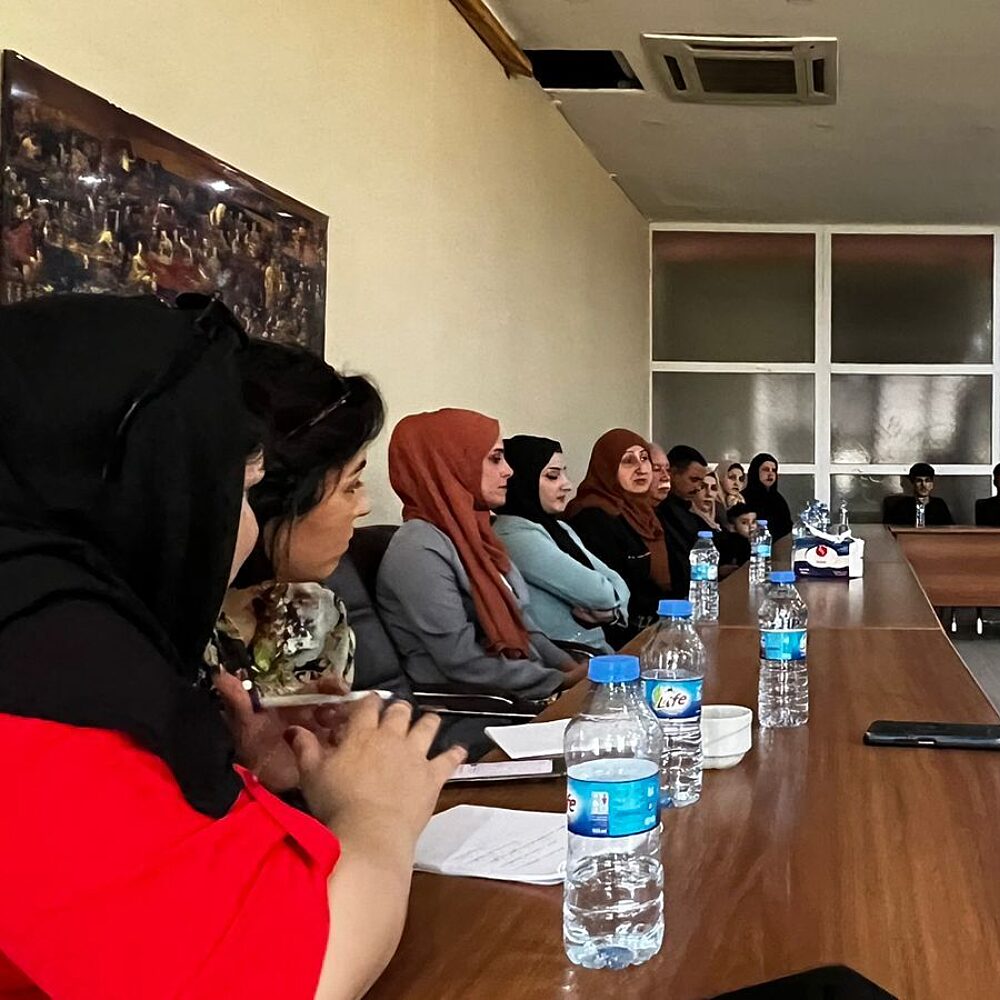
Toolkit on climate-focused mediation and dialogue
This toolkit offers insights, examples and key elements of an approach to addressing climate change related ... -

National Dialogues at crossroads
This series analyses how to best integrate cross-cutting topics in the design of National Dialogues and how ... -
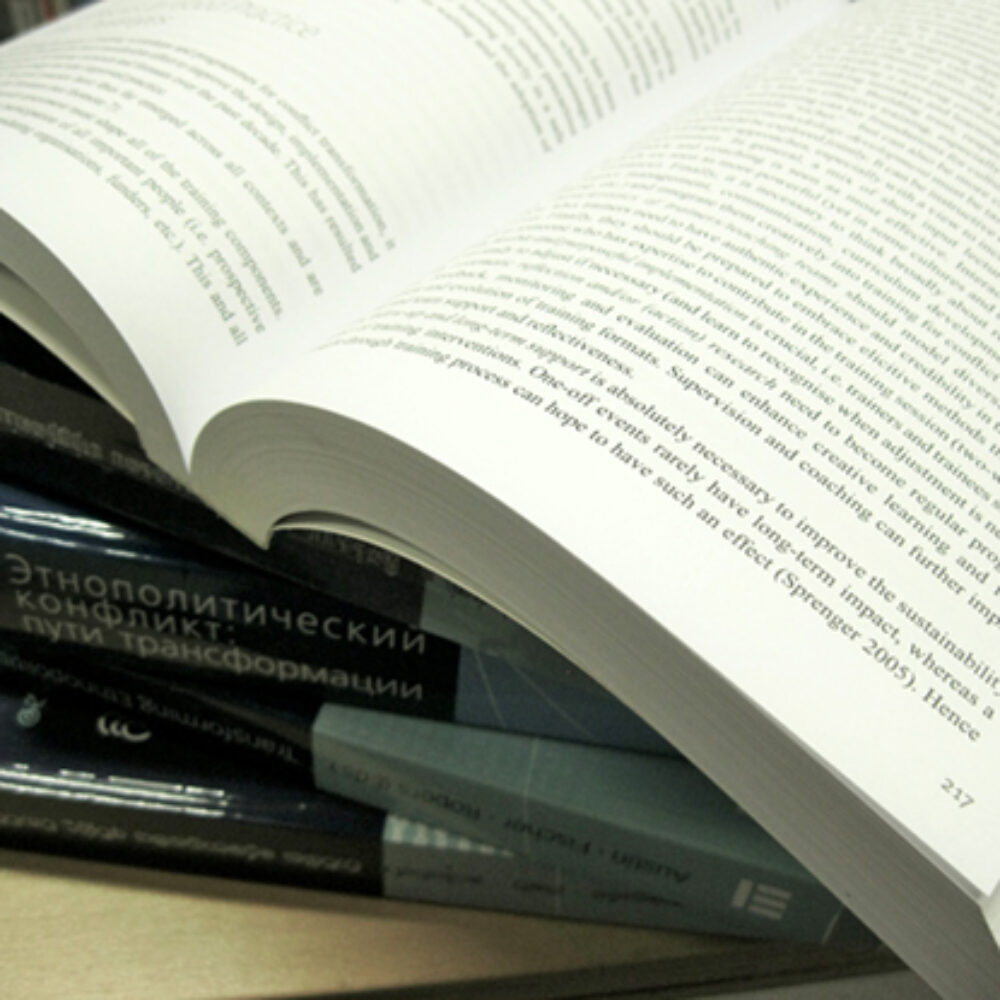
Berghof Handbook for Conflict Transformation
The Berghof Handbook for Conflict Transformation offers a continuously updated online publication platform ... -
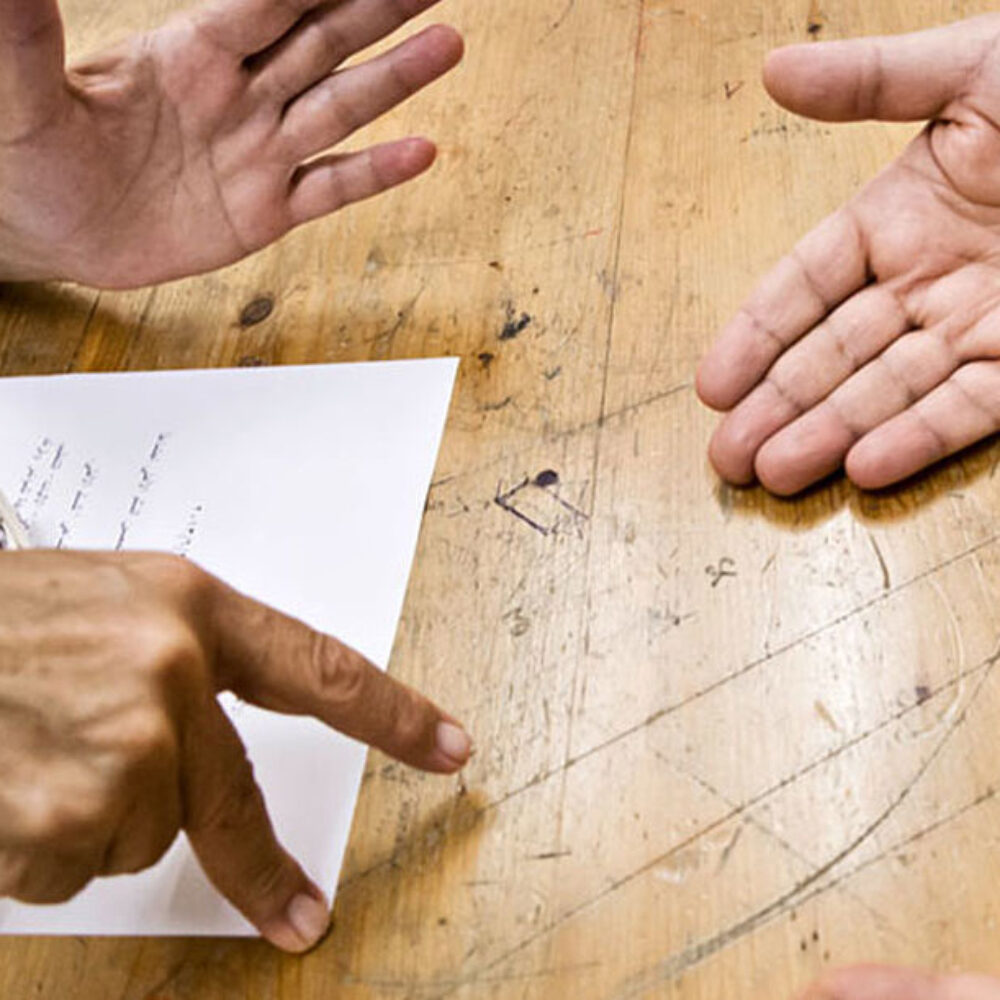
Handbook Dialogues
Handbook Dialogues raise key critical issues which are then debated among scholars and practitioners from ... -

Nexus of peacemaking and constitution building
How does peacemaking, particularly that includes mediated peace negotiations, interface with constitution ... -
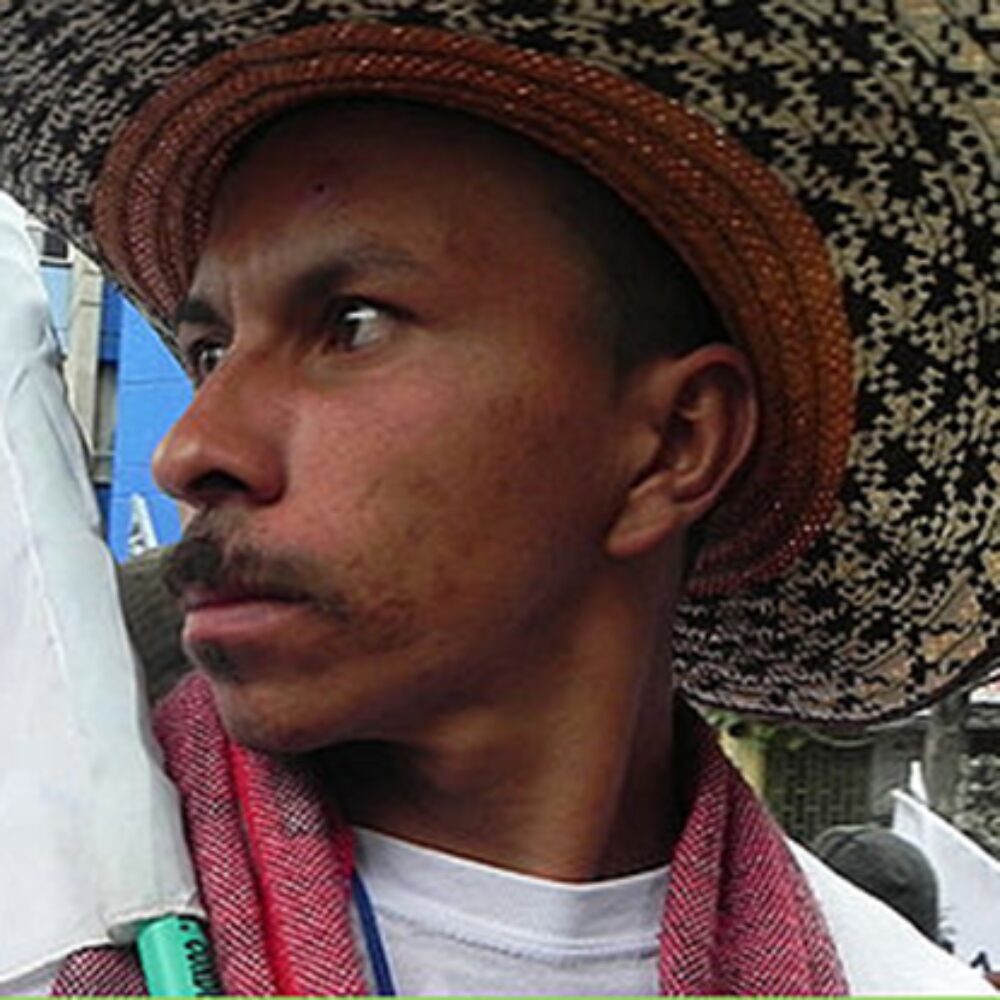
Inclusive Political Settlements
Several background, case study, comparative and policy-related publications were produced within the context ... -

Berghof Transitions Series
The Berghof Transitions Series was initiated in 2008, and originally included case studies produced for a ... -
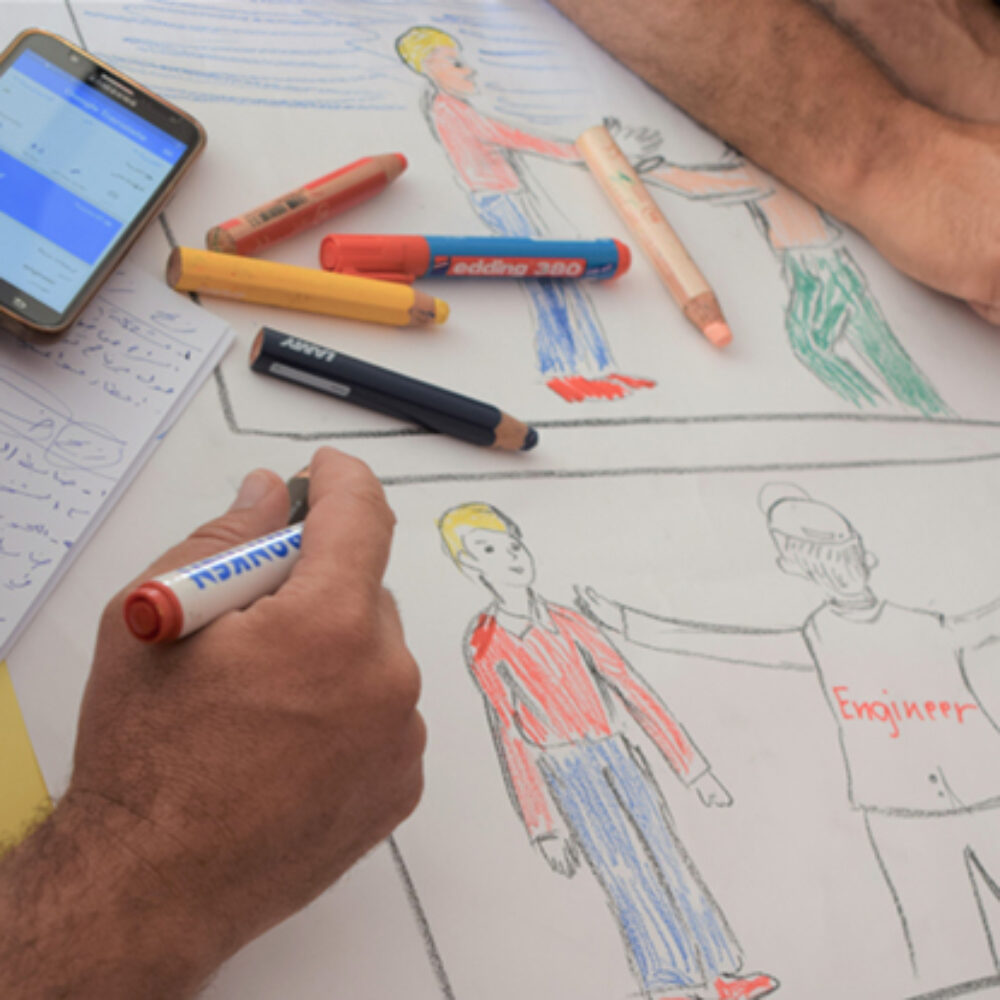
Peace education resources
From classroom materials and curricula, to pedagogical theory, the Berghof Foundation develops resources to ... -

National Dialogue Handbook
Grounded in a series of contemporary case studies, this Handbook aims to contribute to the nascent debate ...
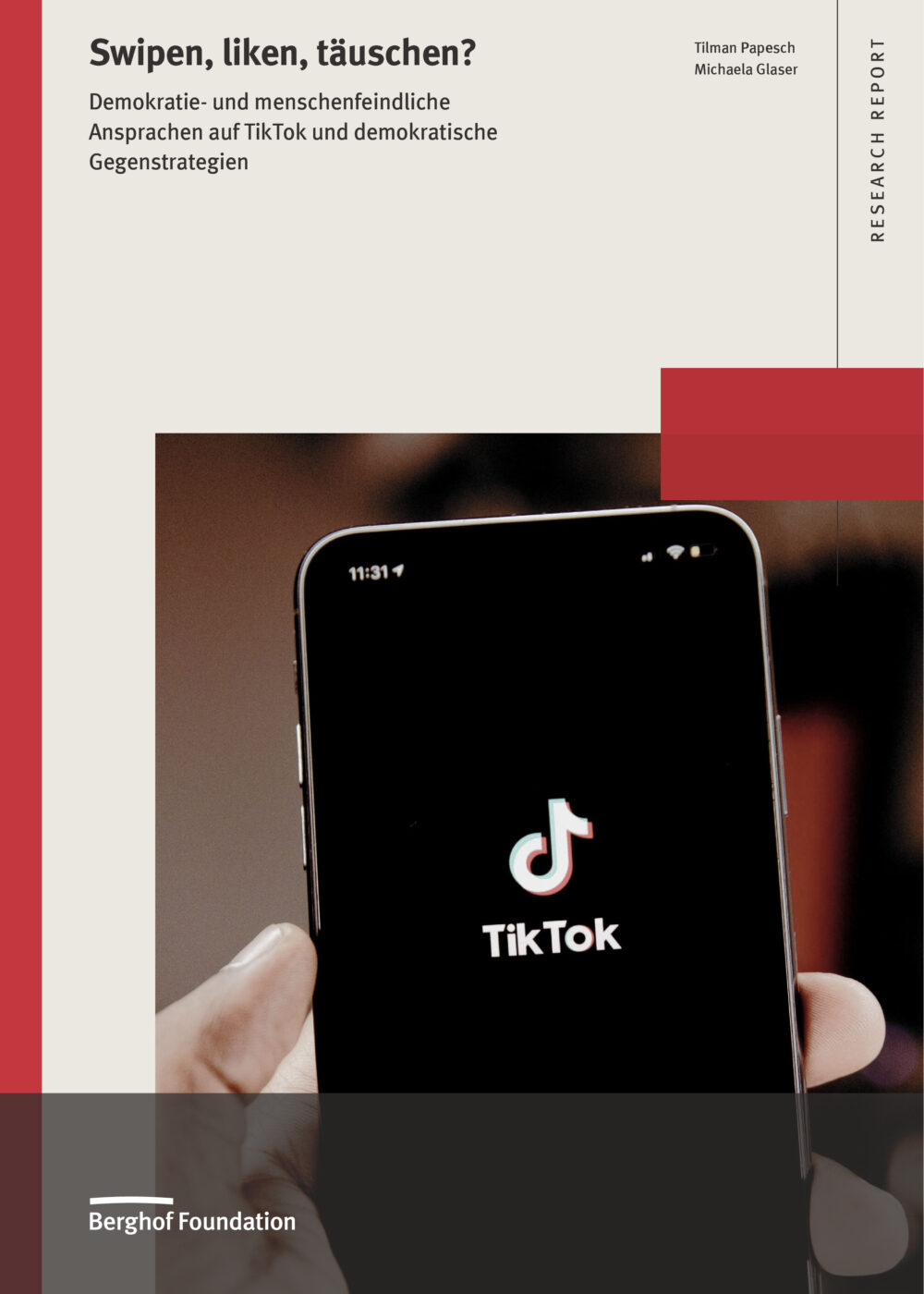
Swipen, liken, täuschen?Demokratie- und menschenfeindliche Ansprachen auf TikTok und demokratische Gegenstrategien
Der Bericht fasst die Ergebnisse einer Studie zusammen, die ursprünglich zur Vorbereitung einer digitalen Narrativkampagne gegen demokratiefeindliche Desinformation auf TikTok durchgeführt wurde. Er bietet zunächst einen Überblick über aktuelle Erkenntnisse zum Vorgehen demokratiefeindlicher Akteur*innen auf der Plattform. Anschließend präsentiert er zentrale Erkenntnisse aus vier Fokusgruppen mit jungen Nutzer*innen, in denen ihre Wahrnehmung demokratie- und menschenfeindlicher Inhalte sowie Kriterien für glaubwürdige und attraktive Gegenbotschaften auf TikTok untersucht wurden. Aufbauend auf diesen Befunden reflektiert der Bericht bestehende Gegenstrategien und formuliert Empfehlungen für wirksame, zielgruppenspezifische Maßnahmen zur Stärkung demokratischer Resilienz im digitalen Raum.
- Year2026
- Author(s)Tilman Papesch, Michaela Glaser
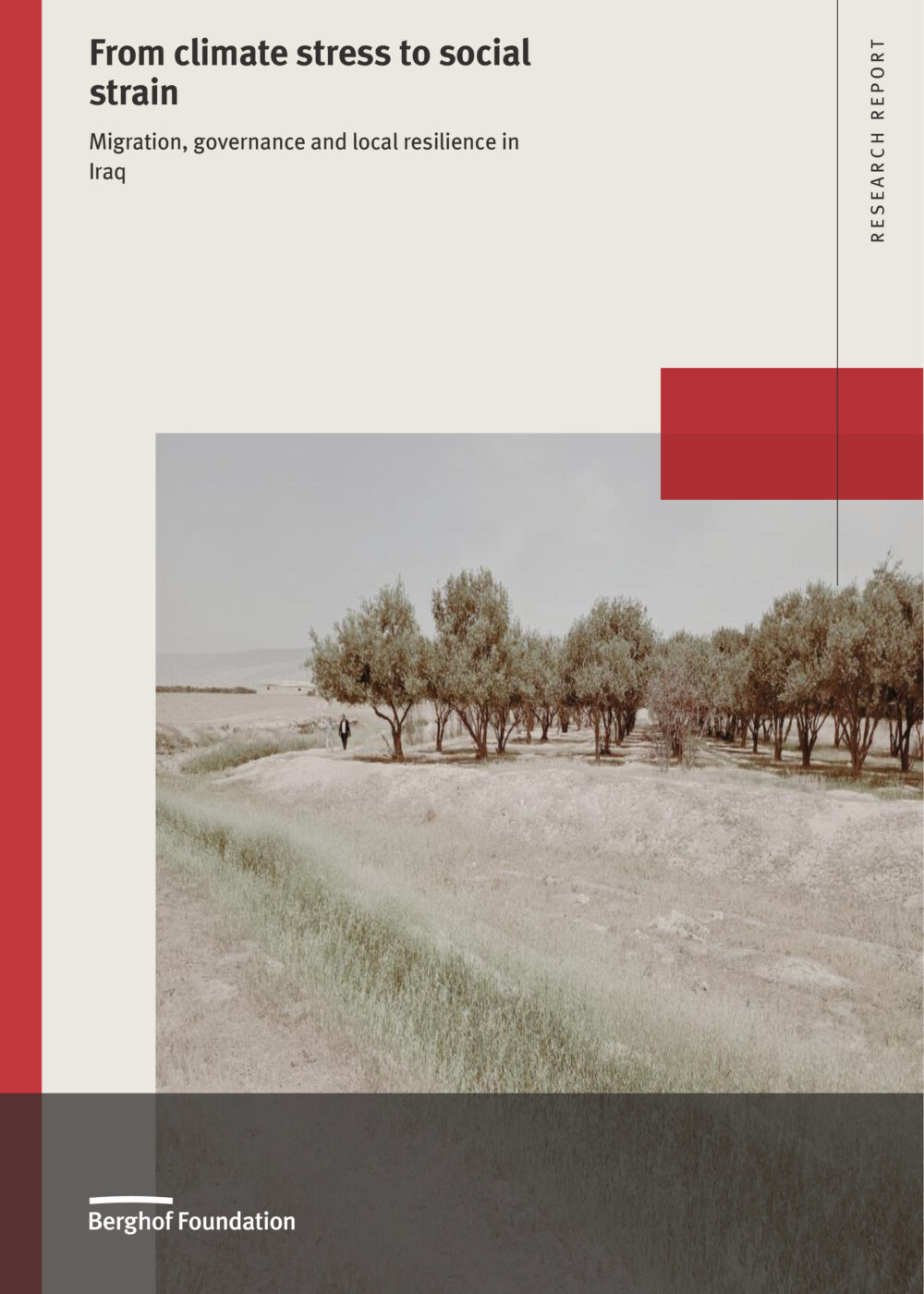
From climate stress to social strainMigration, governance and local resilience in Iraq
This research report examines how climate change, migration and social cohesion intersect across four climate-affected governorates in Iraq: Nineveh, Diyala, Kirkuk and Al-Sulaymaniyah. Using a multi-layered methodology that combines desk reviews, secondary quantitative analysis and field-based insights from key informant interviews and focus group discussions, the underlying research captures the lived realities of local communities behind policy debates and provides evidence-based recommendations.
- Year2026
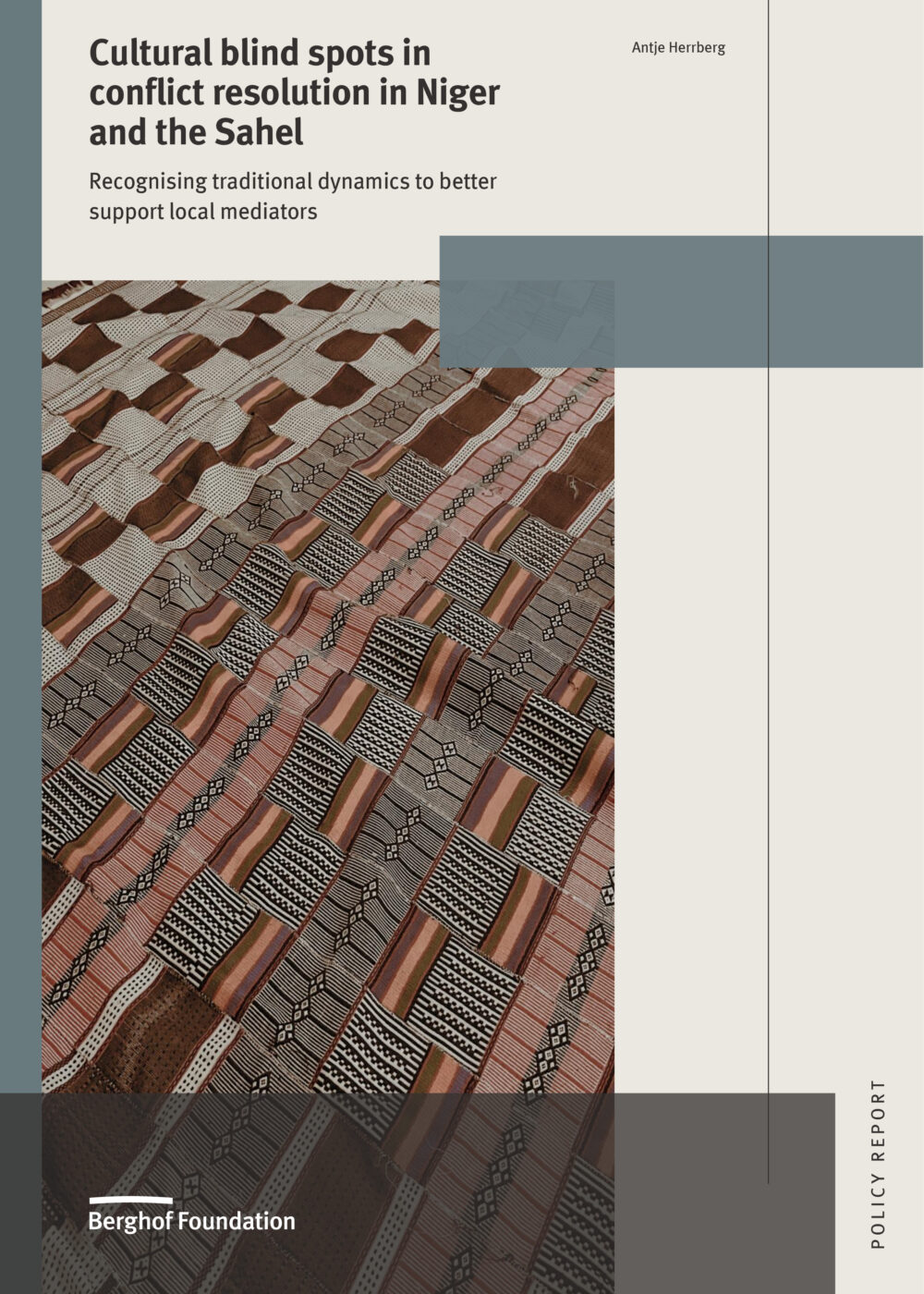
Cultural blind spots in conflict resolution in Niger and the SahelRecognising traditional dynamics to better support local mediators
This policy report explores how cultural blind spots and unexamined assumptions shape international approaches to conflict transformation in Niger and the wider Sahel. Drawing on in-depth interviews with customary authorities, women mediators, youth leaders, former rebels, local researchers and civil society actors, it highlights how dominant Western frameworks often misread local peace dynamics and obscure the ways conflict is actually managed and transformed on the ground.
- Year2026
- Author(s)Antje Herrberg
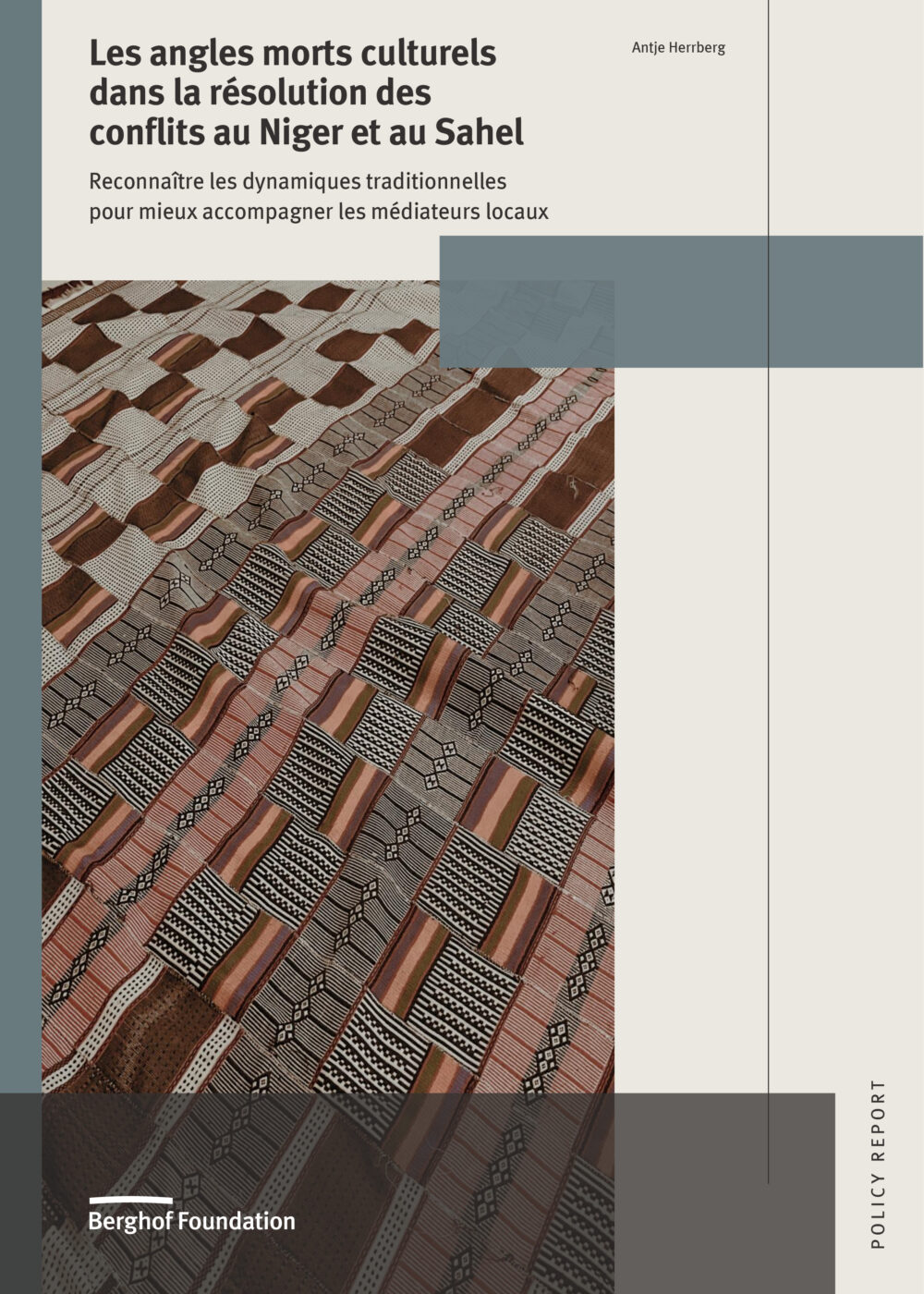
Les angles morts culturels dans la résolution des conflits au Niger et au SahelReconnaître les dynamiques traditionnelles pour mieux accompagner les médiateurs locaux
Ce rapport analyse la manière dont les angles morts culturels façonnent l’engagement international en matière de transformation des conflits au Niger et dans le Sahel. S’appuyant sur des entretiens approfondis menés avec des autorités coutumières, des médiatrices, des leaders de jeunesse, d’anciens rebelles, des chercheurs locaux et des acteurs de la société civile, il examine les présupposés épistémiques et les cadres occidentaux linéaires qui occultent souvent les logiques locales de la paix.
- Year2026
- Author(s)Antje Herrberg

Negotiating the political integration of armed groups in an era of new conflict patterns and changing peacemaking practices
This report offers practical guidance for mediators and peace support actors working in today’s complex and evolving conflict environments. Drawing on case-based insights, it examines how peace processes can support the transition of non-state armed groups from armed struggle to peaceful political participation. It situates these efforts within a changing global context marked by conflict fragmentation that challenge established assumptions about peacemaking. The report argues that political inclusion remains essential for sustainable peace if approaches are adapted to context-specific realities. It concludes with concrete recommendations and tools to help practitioners navigate contemporary challenges and support inclusive conflict transformation.
- Year2025
- Author(s)Véronique Dudouet, Johanna-Maria Hülzer, Gyda Sindre, Mimmi Söderberg Kovacs, Jacqui Cho
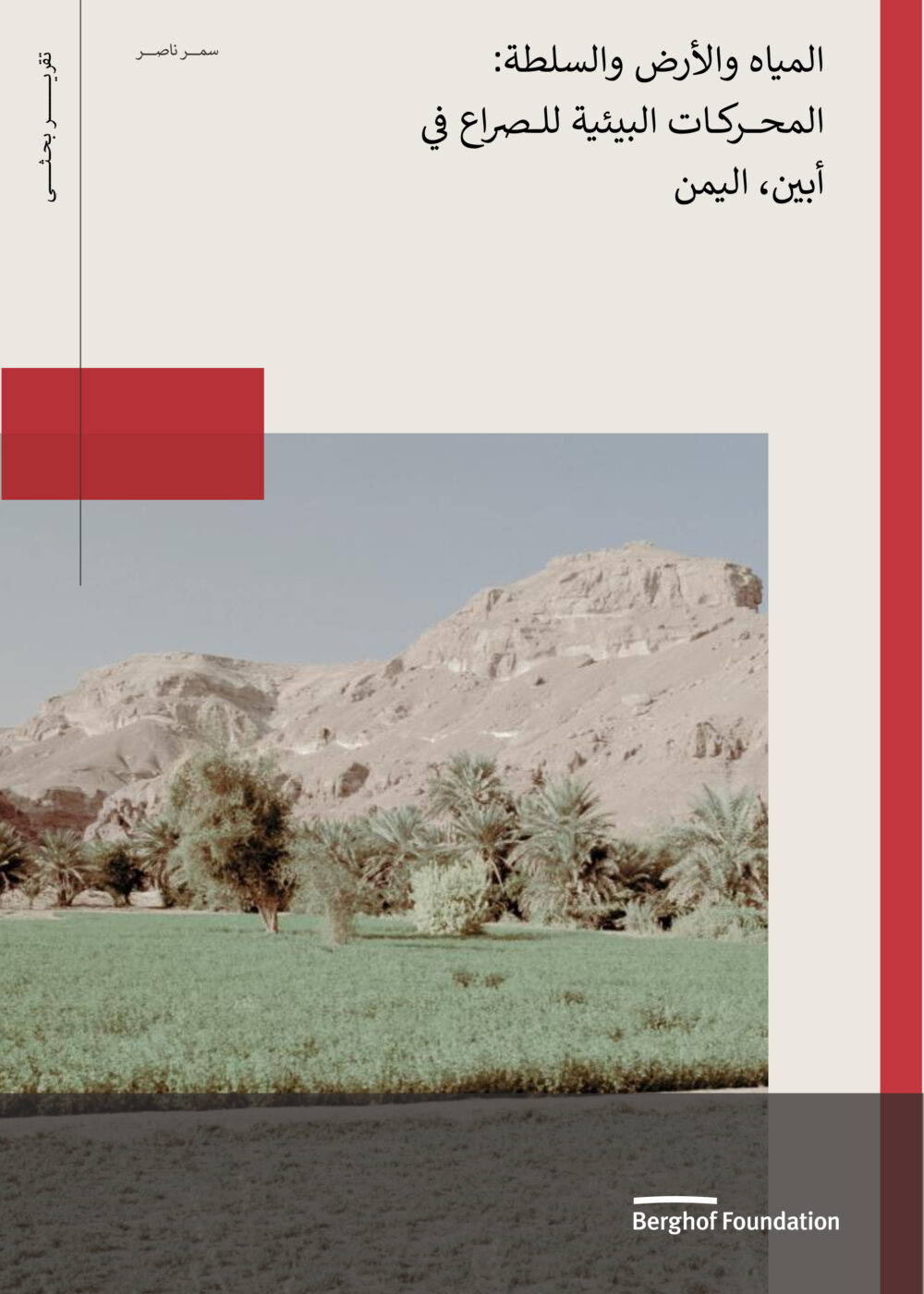
المياه والأرض والسلطة: المحــــــركـــات البيئية للــــصراع في أبين، اليمن
تواجه محافظة أبين في جنوب اليمن ضغوطًا بيئية متزايدة أصبحت من المحرّكات الأساسية للصراع المحلي. فندرة المياه وتدهور الأراضي والظواهر المناخية المتطرفة تؤدي إلى تفاقم التوترات الاجتماعية في منطقة متأثرة أصلًا بالحرب وضعف الحوكمة. وتبحث هذه الدراسة في كيفية مساهمة الضغوط البيئية في تأجيج النزاعات وارتباطها بالنزوح وفقدان سبل العيش وتراجع التماسك الاجتماعي. كما تبرز الدراسة أدوار الأعراف القبلية والسلطات الدينية والحكم المحلي والمبادرات المجتمعية في التوسط في النزاعات المرتبطة بالموارد، وتحدّد فرصًا لأصحاب المصلحة المحليين والجهات المانحة الدولية لتعزيز إدارة البيئة ودعم جهود الوساطة في النزاعات في أبين.
- Year2025
- Author(s)Summer Nasser
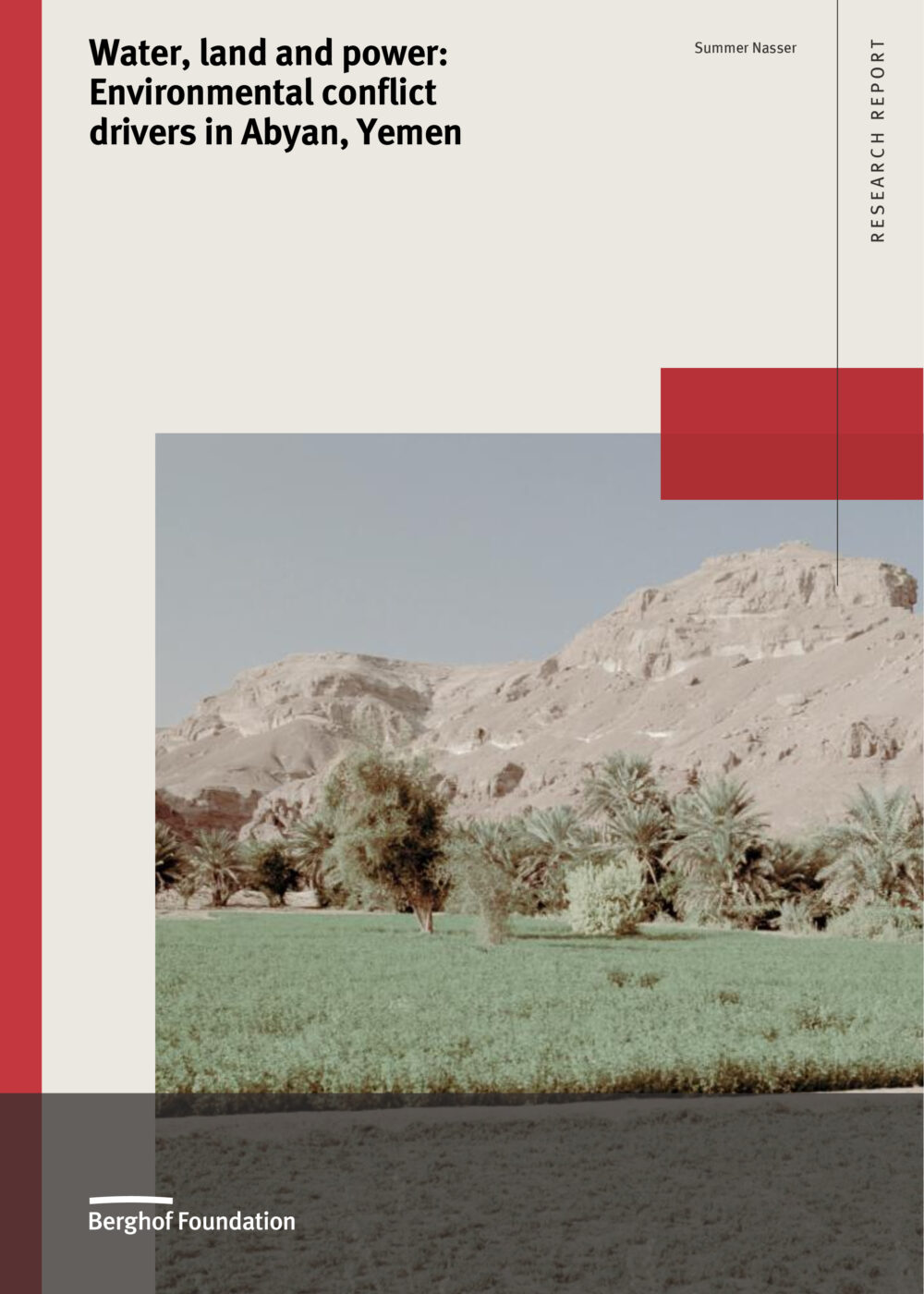
Water, land and power: Environmental conflict drivers in Abyan, Yemen
The Abyan governorate in southern Yemen faces growing environmental pressures that have become key drivers of local conflict. Water scarcity, land degradation and extreme weather events are intensifying social tensions in a region already affected by war and weak governance. This study examines how environmental stressors contribute to disputes and connect to displacement, livelihood loss and declining social cohesion. It also highlights the roles of tribal customs, religious authorities, local governance and community initiatives in mediating resource-related conflicts and identifies opportunities for local stakeholders and international donors to strengthen environmental management and support conflict-mediation efforts in Abyan.
- Year2025
- Author(s)Summer Nasser
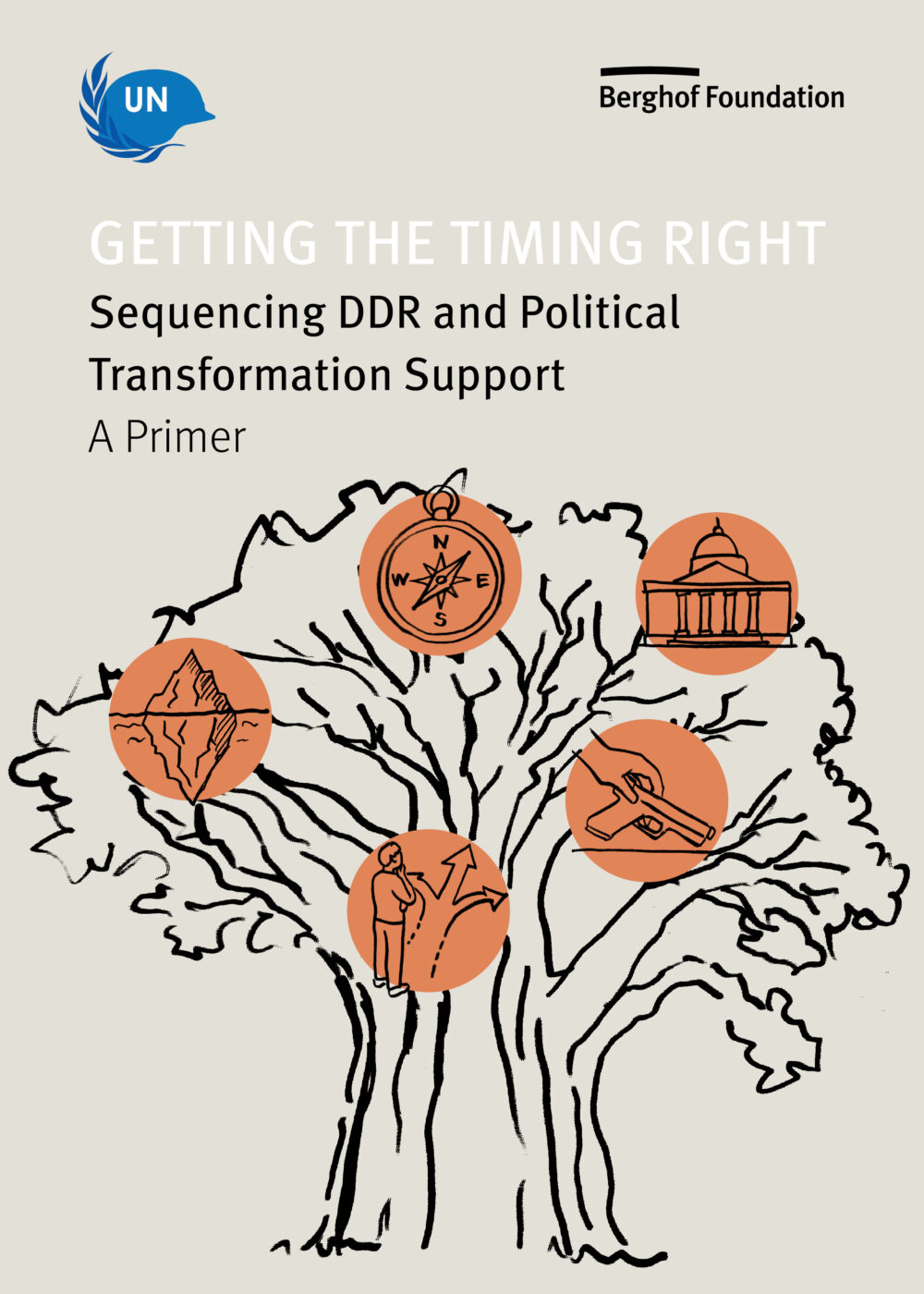
Getting the timing rightSequencing DDR and political transformation support
This Primer provides guidance for DDR practitioners, peacebuilding stakeholders, and international partners on how to sequence DDR efforts alongside political transformation in ways that align and ideally strengthen one another. Using insights from cases like Nepal, Liberia, Northern Ireland, the Philippines, and Colombia, it examines how different sequencing choices affect the relationship between security and political inclusion in post-conflict settings. The document presents conceptual frameworks, comparative case examples and practical principles to help develop more coordinated and context-sensitive strategies.
- Year2025
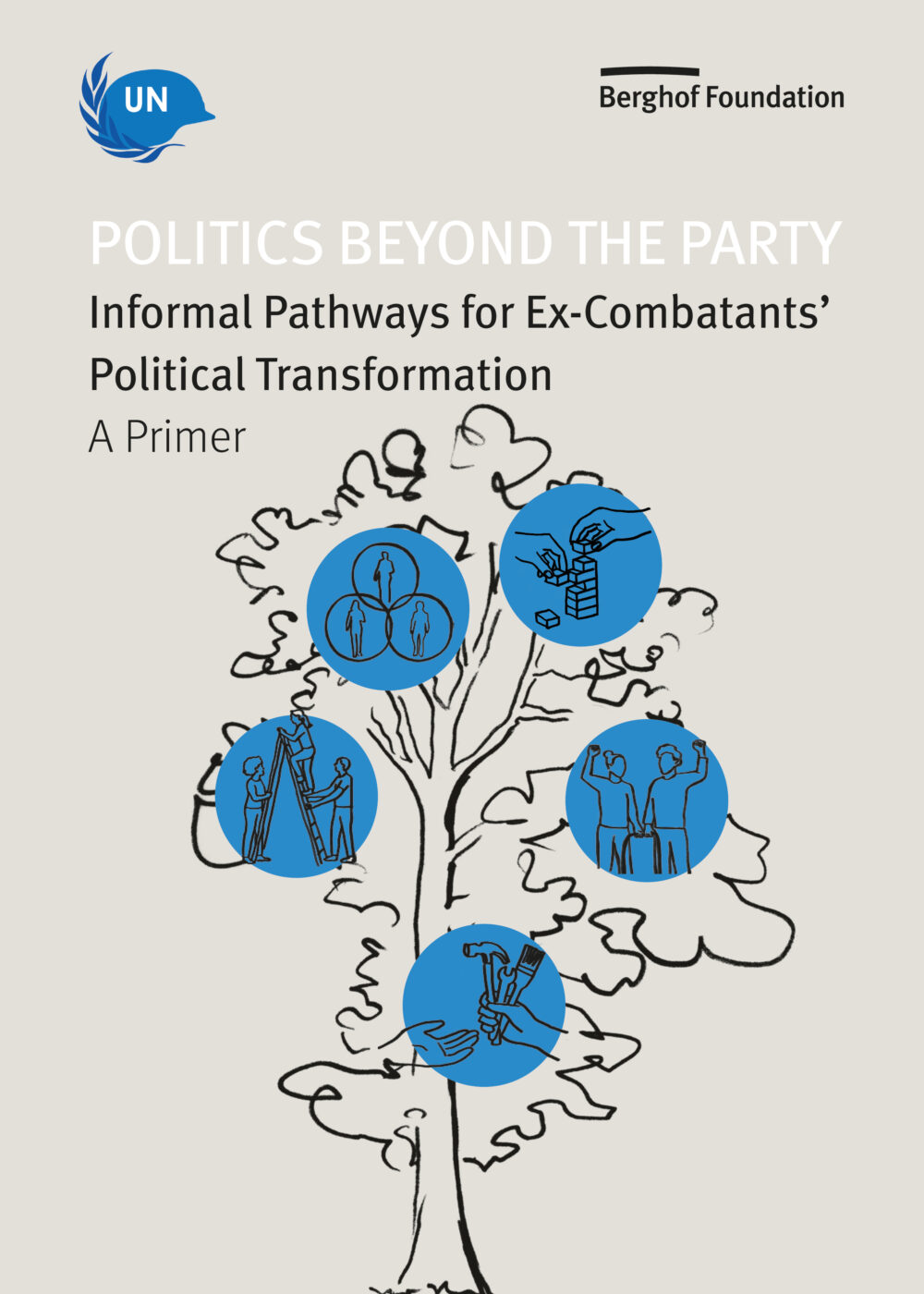
Politics beyond the partyInformal pathways for ex-combatants’ political transformation
The Primer explains the importance of informal political spaces in achieving long-term peace. These arenas are often the most immediate and accessible venues where marginalised groups or lower-level fighters -- including women and young people -- can express their views, develop leadership skills, and take action, especially when formal institutions are inaccessible, exclusive, or no longer trusted. Acknowledging and supporting these peaceful forms of organisation allows DDR and peacebuilding actors to enable ex-combatants to pursue social change without violence, resolve grievances constructively, and rebuild confidence between them and the wider community.
- Year2025
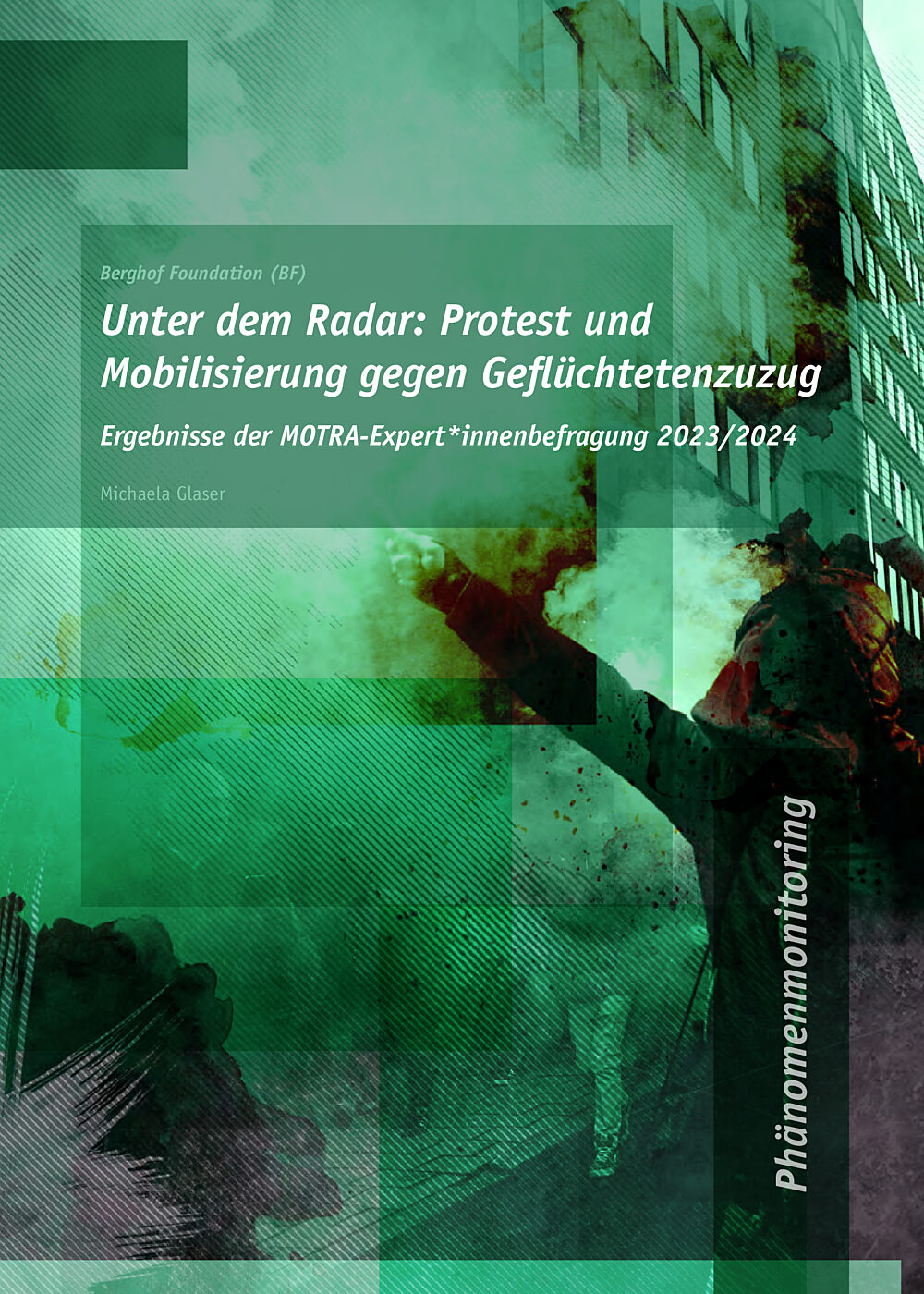
Unter dem Radar: Protest und Mobilisierung gegen GeflüchtetenzuzugErgebnisse der MOTRA-Expert*innenbefragung 2023/2024
Vor dem Hintergrund eines wieder erstarkten Fluchtaufkommens, von kommunalen Überlastungsanzeigen und Debatten um Zuzugsbegrenzungen kam es in 2023 wieder verstärkt zu Protesten gegen die Unterbringung von Geflüchteten. Basierend auf einer bundesweiten Expert*innenbefragung skizziert der Beitrag dieses Protestgeschehen und zeigt regionale Unterschiede sowie Kontinuitäten und Veränderungen seit der Protestwelle in den Jahren 2016 und 2017 auf.
- Year2025
- Author(s)Michaela Glaser
